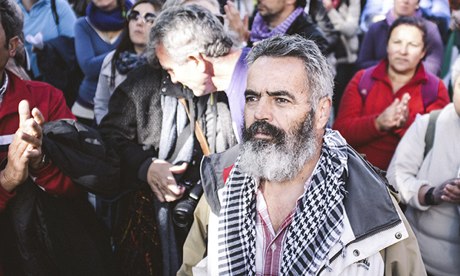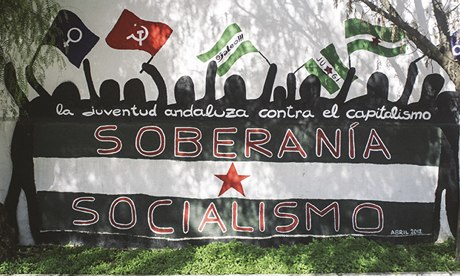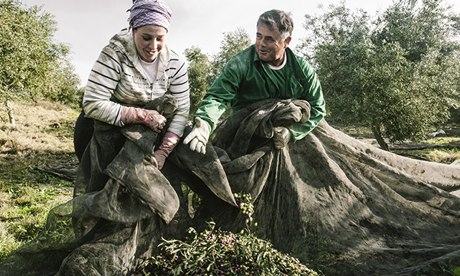In 2004, I was leafing through a travel guide to Andalusia while on holiday in Seville, and read a fleeting reference to a small, remote village called Marinaleda – "a communist utopia" of revolutionary farm labourers, it said. I was immediately fascinated, but I could find almost no details to feed my fascination. There was so little information about the village available beyond that short summary, either in the guidebook, on the internet, or on the lips of strangers I met in Seville. "Ah yes, the strange little communist village, the utopia," a few of them said. But none of them had visited, or knew anyone who had – and no one could tell me whether it really was a utopia. The best anyone could do was to add the information that it had a charismatic, eccentric mayor, with a prophet's beard.
Eventually I found out more. The first part of Marinaleda's miracle is that when its struggle to create utopia began, in the late 1970s, it was from a position of abject poverty. The village was suffering more than 60% unemployment; it was a
farming community with no land, its people frequently forced to go without food for days at a time, in a period of Spanish history mired in uncertainty after the death of the fascist dictator General Franco. The second part of Marinaleda's miracle is that over three extraordinary decades, it won. Some distance along that remarkable journey of struggle and sacrifice, in 1985, Sánchez Gordillo told the newspaper
El País: "We have learned that it is not enough to define utopia, nor is it enough to fight against the reactionary forces. One must build it here and now, brick by brick, patiently but steadily, until we can make the old dreams a reality: that there will be bread for all, freedom among citizens, and culture; and to be able to read with respect the word 'peace '. We sincerely believe that there is no future that is not built in the present."
As befits a rebel, Sánchez Gordillo is fond of quoting
Che Guevara; specifically Che's maxim that "only those who dream will someday see their dreams converted to reality". In one small village in southern
Spain, this isn't just a T-shirt slogan.
In spring 2013 unemployment in Andalusia is a staggering 36%; for those aged 16 to 24, the figure is above 55% – figures worse even than the egregious national average. The construction industry boom of the 2000s saw the coast cluttered with cranes and encouraged a generation to skip the end of school and take the €40,000-a-year jobs on offer on the building sites. That work is gone, and nothing is going to replace it. With the European Central Bank looming ominously over his shoulder, prime minister
Mariano Rajoy has introduced labour reforms to make it much easier for businesses to sack their employees, quickly and with less compensation, and these new laws are now cutting swaths through the Spanish workforce, in private and public sectors alike.
Spain experienced a massive housing boom from 1996 to 2008. The price of property per square metre tripled in those 12 years: its scale is now tragically reflected in its crisis. Nationally, up to 400,000 families have been evicted since 2008. Again, it is especially acute in the south: 40 families a day in Andalusia have been turfed out of their homes by the banks. To make matters worse, under Spanish housing law, when you're evicted by your mortgage lender, that isn't the end of it: you have to keep paying the mortgage. In final acts of helplessness, suicides by homeowners on the brink of foreclosure have become horrifyingly common – on more than one occasion, while the bailiffs have been coming up the stairs, evictees have hurled themselves out of upstairs windows.
When people refer to
la crisis in Spain they mean the eurozone crisis, an economic crisis; but the term means more than that. It is a systemic crisis, a political ecology crack'd from side to side: a crisis of seemingly endemic corruption across the country's elites, including politicians, bankers, royals and bureaucrats, and a crisis of faith in the democratic settlement established after the death of Franco in 1975. A poll conducted by the (state-run) centre for sociological research in December 2012 found that 67.5% of Spaniards said they were unhappy with the way their democracy worked. It's this disdain for the Spanish state in general, rather than merely the effects of the economic crisis, that brought 8 million
indignados on to the streets in the spring and summer of 2011, and informed their rallying cry "Democracia Real Ya" (real democracy now).
 Juan Manuel Sánchez Gordillo, mayor of Marinaleda, attending a protest in Seville. Photograph: Dave Stelfox
Juan Manuel Sánchez Gordillo, mayor of Marinaleda, attending a protest in Seville. Photograph: Dave Stelfox
But in one village in Andalusia's wild heart, there lies stability and order. Like Asterix's village impossibly holding out against the Romans, in this tiny pueblo a great empire has met its match, in a ragtag army of boisterous upstarts yearning for liberty. The bout seems almost laughably unfair – Marinaleda's population is 2,700, Spain's is 47 million – and yet the empire has lost, time and time again.
In 1979, at the age of 30, Sánchez Gordillo became the first elected mayor of Marinaleda, a position he has held ever since – re-elected time after time with an overwhelming majority. However, holding official state-sanctioned positions of power was only a distraction from the serious business of
la lucha – the struggle. In the intense heat of the summer of 1980, the village launched "a hunger strike against hunger" which brought them national and even global recognition. Everything they have done since that summer has increased the notoriety of Sánchez Gordillo and his village, and added to their admirers and enemies across Spain.
Sánchez Gordillo's philosophy, outlined in his 1980 book
Andaluces, Levantaos and in countless speeches and interviews since, is one which is unique to him, though grounded firmly in the historic struggles and uprisings of the peasant pueblos of Andalusia, and their remarkably deep-seated tendency towards anarchism. These
communities are striking for being against all authority. "I have never belonged to the communist party of the hammer and sickle, but I am a communist or communitarian," Sánchez Gordillo said in an interview in 2011, adding that his political beliefs were drawn from those of Jesus Christ, Gandhi, Marx, Lenin and Che.
In August 2012 he achieved a new level of notoriety for a string of actions that began, in 40C heat, with the occupation of military land, the seizure of an aristocrat's palace, and a three-week march across the south in which he called on his fellow mayors not to repay their debts. Its peak saw Sánchez Gordillo lead a series of expropriations from supermarkets, along with fellow members of the left-communist trade union SOC-SAT. They marched into supermarkets and took bread, rice, olive oil and other basic supplies, and donated them to food banks for Andalusians who could not feed themselves. For this he became a superstar, appearing not only on the cover of Spanish newspapers, but in the world's media, as "the Robin Hood mayor", "the Don Quixote of the Spanish crisis", or "Spain's William Wallace", depending on which newspaper you read.
 A socialist mural in Marinaleda. Photograph: Dave Stelfox
A socialist mural in Marinaleda. Photograph: Dave Stelfox
In the darkness of a winter morning, between 6 and 7am, Marinaleda's workers are clustered around the counter of the orange-painted patisserie Horno el Cedazo. Here they stand, knocking back strong, dark coffee accompanied by orange juice, pastries and
pan con tomate: truly one of the world's best breakfasts, a large hunk of toast served alongside a bottle of olive oil and a decanter of sweet, salty, pink tomato pulp. Pour on one, then the other, then a sprinkling of salt and pepper, and you are ready for a day in the fields. Those with stronger stomachs also knock back a shot of one of the lurid-coloured liqueurs arrayed on a high shelf behind the counter; the syrupy, pungent
anís is the most popular of these coffee chasers. All work in the Marinaleda co-operative in shifts, depending on what needs harvesting, and how much of it there is. If there's enough work for your group, then you will be told in advance, through the loudspeaker on the van that circles the village in the evenings. It's a strange, quasi-Soviet experience, sitting at home and hearing the van drive past announcing: "Work in the fields tomorrow for group B". The static-muffled announcements get louder and then quieter as the van winds through the village's narrow streets, like someone lost in a maze carrying a transistor radio.
When the 1,200-hectare El Humoso farm was finally won in 1991 – awarded to the village by the regional government following a decade of relentless occupations, strikes and appeals – cultivation began. The new Marinaleda co-operative selected crops that would need the greatest amount of human labour, to create as much work as possible. In addition to the ubiquitous olives and the oil-processing factory, they planted peppers of various kinds, artichokes, fava beans, green beans, broccoli: crops that could be processed, canned, and jarred, to justify the creation of a processing factory that provided a secondary industry back in the village, and thus more employment. "Our aim was not to create profit, but jobs," Sánchez Gordillo explained to me. This philosophy runs directly counter to the late-capitalist emphasis on "efficiency" – a word that has been elevated to almost holy status in the neoliberal lexicon, but in reality has become a shameful euphemism for the sacrifice of human dignity at the altar of share prices.
Sánchez Gordillo once suggested to me that the aristocratic family of the House of Alba could invest its vast riches (from shares in banks and power companies to multimillion-euro agricultural subsidies for its vast tracts of land) to create jobs, but had never shown any interest in doing so. "We believe the land should belong to the community that works it, and not in the dead hands of the nobility." That's why the big landowners planted wheat, he explained – wheat could be harvested with a machine, overseen by a few labourers; in Marinaleda, crops like artichokes and tomatoes were chosen precisely because they needed lots of labour. Why, the logic runs, should "efficiency" be the most important value in society, to the detriment of human life?
The town co-operative does not distribute profits: any surplus is reinvested to create more jobs. Everyone in the co-op earns the same salary, €47 (£40) a day for six and a half hours of work: it may not sound like a lot, but it's more than double the Spanish minimum wage. Participation in decisions about what crops to farm, and when, is encouraged, and often forms the focus of the village's general assemblies – in this respect, being a
cooperativista means being an important part of the functioning of the pueblo as a whole. Where once the day labourers of Andalusia were politically and socially marginalised by their lack of an economic stake in their pueblo, they are now – at least in Marinaleda – called upon to lead the way. Non-co-operativists are by no means excluded from involvement in the town's political, social and cultural life – it's more that if you are a part of the co-operative, you can't avoid being swept up in local activities outside the confines of the working day.
Private enterprise is permitted in the village – perhaps more importantly, it is still an accepted part of life. As with the seven privately owned bars and cafés in the village (the Sindicato bar is owned by the union), if you wanted to open a pizzeria or a little family business of any kind, no one would stand in your way. But if a hypothetical head of regional development and franchising for, say, Carrefour, or Starbucks, with a vicious sense of humour and a masochistic streak, decided this small village was the perfect spot to expand operations, well – they wouldn't get very far. "We just wouldn't allow it," Sánchez Gordillo told me bluntly.
Marinaleda's alternative is decades in the making, but other anti-capitalist alternatives are sprouting in the cracks of the Spanish crisis, in the form of numerous quotidian acts of resistance, not just strikes and protests, but everyday behaviour – the occupation of vacant new-builds by those made homeless by their banks, firemen refusing to evict penniless families, doctors refusing to turn away undocumented immigrants. There is also a new Marinaleda-style farming co-operative in Somonte, a collective farm established on occupied government land in 2012, only an hour or so's drive from the village. When I visited Somonte earlier this year, I met
Marinaleños who had left their home to bring Sanchez Gordillo's message of "land belongs to those who work it" to new terrain.
When I visited in February this year, a young man called Román strode bare-chested through the endless fields to greet us, looking strong but tired – they work from dawn until dusk, stopping only to dip into much-needed cauldrons full of pasta, rice and bean stews; surplus vegetables are sold on market day in nearby towns. They were growing beans, pimentos, potatoes and cabbages when I visited, planting trees and trying to resuscitate 400 hectares of idle land – as best they could, with only two dozen pairs of hands. Paradoxically, in light of Spain's staggering unemployment figures, they still need more people to join their co-operative, and have more farmland than they can currently cultivate. One of the murals painted on the Somonte barn wall contained a telling slogan, alongside portraits of Malcolm X, Geronimo and Zapata: "Andalusians, don't emigrate, fight! The land is yours: recover it!" It's a message cried somewhat into the void, as thousands of young Spaniards scurry down the brain drain to Britain, Germany, France and beyond.
But Somonte is not without support. Hundreds of people have visited at weekends or for short stays, from Madrid, Seville and many from overseas, bringing their labour and other resources, to help with the land, to build infrastructure or paint murals, donating secondhand farming equipment, furniture and kitchenware. As we strolled past a small collection of chickens and goats, Florence, a French woman who had been living in Marinaleda before joining the "new struggle" in Somonte, explained that the land was some of the most fertile in Spain, but had for decades been used by the government to grow corn, to bring in European subsidies – it created next to no work, and no produce; the corn was left to rot. Those 400 wasted hectares were about to be auctioned off privately by the government when the Andalusian Workers' Union turned up in March 2012; they occupied it, were evicted by 200 riot police, and in true Marinaleda style, returned the next day to start again. The auction never took place. Somonte is now 18 months old, growing slowly but steadily, and is the kind of Marinaleda domino effect that the crisis may yet bring more of.
No one ever forgets "that strange and moving experience" of believing in a revolution, as George Orwell reflected after arriving in Barcelona on the brink of civil war to a society fizzing with energy as it fleetingly experienced living
communism. Marinaleda is neither fully communist nor fully a utopia: but take a step outside the pueblo and into contemporary Spain, and you will see a society pummelled, impoverished and atomised, pulled into death and destruction by an economic system and a political class who seem not to care whether the poor live or die. Sánchez Gordillo's achievements are more than just the concrete gains of land, housing, sustenance and culture, phenomenal though they are: being there is a strange and moving experience, and, as Orwell suggested, an unforgettable one.
In the eight or so years I have known about Marinaleda, I have sometimes had to remind myself of the gap between the grandiose claims made about the village, by left and right alike, and the humble size and intimacy of the place itself. It is a village which means so much to so many people, across the world; but it has only 2,700 inhabitants, and whole hours can pass in which the only noise emanates from a motorcycle speeding down Avenida de la Libertad, or the vocal exercises of a particularly enervated rooster.
It is both poignant and appropriate that Sánchez Gordillo seems to see no bathos, or discrepancy, in devoting as much attention and passion to the local specifics of the pueblo – the need to start planting artichokes this month, not pimentos – as he does to the big picture, persuading the world that only an end to capitalism will restore dignity to the lives of billions.
The
indignado movement had informed not just Spain, but the world, that millions of Spaniards were unwilling to brook the crisis. They were desperately looking for an alternative to the current system – and yet, in their midst, there was already one in operation. Faced with the massed ranks protesting in Puerta del Sol in Madrid, in Wall Street in New York, and outside St Paul's Cathedral in London, the damning questions rang out from conservatives and liberals: "What's your alternative? What's your programme? How would it work in practice?"
They may have ignored the village before, or dismissed it with a chuckle as a rural curiosity run by a bearded eccentric; but they can do so no longer. "What's your alternative?' bark the dogs of capitalist realism. Increasingly, the
indignados are able to respond: 'Well, how about Marinaleda?'"
=============================































http://www.huffingtonpost.com/jeff-schweitzer/god-created-gravity-why-t_b_4387942.html